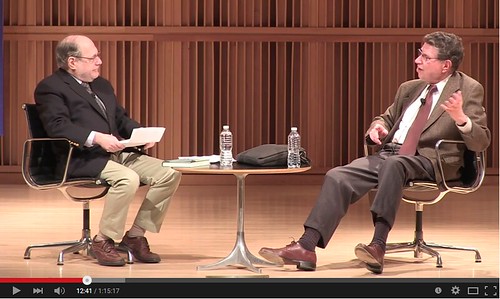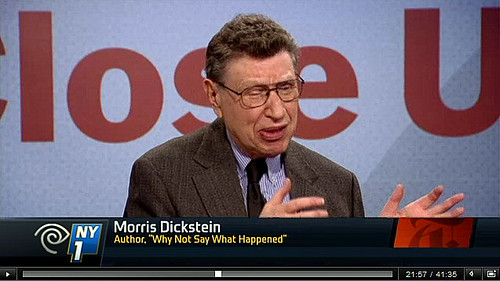
A renowned cultural critic tells his own deeply engaging story of growing up in the turbulent American culture of the postwar decades.
At once a coming-of-age story, an intellectual autobiography, and vivid cultural history, Why Not Say What Happened is an eloquent, gripping account of an intellectual and emotional education from one of our leading critics. In this “acutely observed, slyly funny memoir” (Molly Haskell), Morris Dickstein evokes his boisterous and close-knit Jewish family, his years as a yeshiva student that eventually led to fierce rebellion, his teenage adventures in the Catskills and in a Zionist summer camp, and the later education that thrust him into a life-changing world of ideas and far-reaching literary traditions. Dickstein brilliantly depicts the tension between the parochial religious world of his youth and the siren call of a larger cosmopolitan culture, a rebellion that manifested itself in a yarmulka replaced by Yankees cap, a Shakespeare play concealed behind a heavy tractate of the Talmud, and classes cut on Wednesday afternoons to take in the Broadway theater.
Tracing a path from the Lower East Side to Columbia University, Yale, and Cambridge, Dickstein leaves home, travels widely, and falls in love, breaking through to new experiences of intimacy and sexual awakening, only to be brought low by emotional conflicts that beset him as a graduate student—homesickness, a sense of cultural dislocation—issues that come to a head during a troubled year abroad. In Why Not Say What Happened we see Dickstein come into his own as a teacher and writer deeply engaged with poetry: the “daringly modern” Blake, the bittersweet “negotiations of time and loss” in Wordsworth, and the “shifting turns of consciousness itself” in Keats. While eloquently evoking the tumult of the sixties and a culture in flux, Why Not Say What Happened is enlivened by Dickstein’s “Zelig-like presence at nearly every significant aesthetic and political turning of the second half of the American twentieth century” (Cynthia Ozick). Dickstein crafts memorable portraits of his own mentors and legendary teachers like Lionel Trilling, Peter Gay, F. R. Leavis, and Harold Bloom, who become inimitable role models. They provide him with a world-class understanding of how to read and nourish his burgeoning feeling for literature and history. In the tradition of classic memoirs by Alfred Kazin and Irving Howe, this frank and revealing story, at once keenly personal and broadly cultural, sheds light on the many different forms education can take.
.
Excerpts:
The Zionist Dream in the Poconos
Finding My Way: Junior Year, 1959
Reviews:
Read Reviews of Why Not Say What Happened
Videos:
Camus in New York at the French Embassy
Coming of Age in Midcentury America: Morris Dickstein in Conversation with Gary Giddins
Why Not Say What Happened: Tenement Talk with Morris Dickstein
Essays:
What Really Happened: Writing a Memoir
Los Angeles Review of Books, May 16, 2015
In recent years, whenever someone asked me what I was working on, I would hesitate a moment. “A memoir,†I’d say, never quite sure of the reaction I’d get. Friends would perk up, perhaps pleased that I was doing something different, “creative†rather than critical. I could see they were curious to learn more about me. Other reactions were more skeptical, though the skeptics were usually too polite to object directly. Someone I knew in passing was less restrained: “What do you have to write about?†It was rude but there were times I agreed with him. Too many people were publishing memoirs: you could say there was a glut in the market. After all, what were my credentials for writing about myself? I hadn’t served as secretary of state, committed high crimes or misdemeanors, or found a cure for cancer. From a lifetime of teaching and writing, I couldn’t report on titanic battles with addiction or any spectacular breakdowns. It’s true that I had lived in interesting times, that accursed fate, but I was an intellectual, part of that rarefied breed, awash in a medium of arguments and ideas.
Interviews on Why Not Say What Happened:
Re-Markings American Culture in the Sixties: A Conversation with Morris Dickstein, Jonah Raskin, September 2015
Columbia Magazine, BOOKTALK: Notes of a Literary Partisan, Spring 2015
Coming of Age in Midcentury America: Morris Dickstein in Conversation with Gary Giddins, The Graduate Center, CUNY. March 18, 2015.
Presented by GC Public Programs; co-sponsored by the Leon Levy Center for Biography and the Center for the Humanities.
Video: Coming of Age in Midcentury America: Morris Dickstein in Conversation with Gary Giddins

The Tenement Museum: Morris Dickstein in conversation with Adam Kirsch. April, 15, 2015
Morris Dickstein, the renowned cultural historian who has shed light on significant moments in America from the Great Depression to the 1960s, started off on the Lower East Side. His memoir traces a life from the LES to Columbia University, Yale, and Cambridge and reflects on his path in becoming a public intellectual. The book has been called at once a coming-of-age story, an intellectual autobiography, and vivid cultural history. Poet and literary critic Adam Kirsch joins Dickstein in conversation.
Video: Why Not Say What Happened: Tenement Talk with Morris Dickstein

The New York Times Close Up. February 28, 2015
Professor Morris Dickstein turns to his life for his latest book, “Why Not Say What Happened: A Sentimental Education,” reviewed in this week’s Times Book Review section.
Video: The New York Times Close Up

Recently Posted by Morris Dickstein:
New! Balzac’s Novel of Female Friendship New York Review of Books, Jan 9, 2018
New! John O’Hara: Something to remember him by, Times Literary Supplement, May 12, 2017
Podcast: Being Jewish, Being American Morris Dickstein on The New Diaspora, Times Literary Supplement podcast, April 13, 2016.
Review: Ways of Being Jewish, Morris Dickstein on The New Diaspora, Times Literary Supplement, April 13, 2016.
Review: Morris Dickstein on Langston Hughes, Wall Street Journal, August 8, 2015.
Review: Bernard Malamud’s Novels and Stories of the 1940s & 50s; and Novels and Stories of the 1960s, Times Literary Supplement, February 18, 2015.
Double Lives – Leonard Bernstein’s Letters, Times Literary Supplement, July 18, 2014.
The Urban Spectacle of Reginald Marsh, Swing Time: Reginald Marsh and Thirties New York, New York Historical Society, 2013.
The Moment of the Novel and the Rise of Film Culture, Raritan, Summer 2013 (PDF)
The Milk of Human Kindness. Review of A. B. Yehoshua, The Retrospective. Moment Magazine,March-April 2013.
The Daily Round. Review of two collections of essays by Phillip Lopate. New York Times Book Review, March 3, 2013.
Carl Van Vechten and the Harlem Renaissance. Times Literary Supplement, May 4, 2012.
The Catch in Catch-22, The Daily Beast, September 4, 2011.
Growing Pains. On Delmore Schwartz’s stories. Tablet Magazine, August 11, 2011.
Review of Benjamin Balint’s Running Commentary. Times Literary Supplement, August 20-27, 2010
High Five with Morris Dickstein. Dickstein discusses his five favorite musicals. Forbes, March 3, 2010.
Review of Philip Roth’s “Nemesisâ€. The Daily Beast, October 3, 2010.
Review of Christopher Bigsby’s Arthur Miller: 1915-1962. Times Literary Supplement, July 24, 2009.
Ralph Ellison Visible: on Arnold Rampersad’s biography of Ellison. Times Literary Supplement, May 23, 2007.
The Toils of Bernard Malamud: Review of Janna Malamud Smith’s My Father is a Book. Times Literary Supplement, May 12, 2006.
Review of Lewis M. Dabney’s Edmund Wilson: A Life in Literature. Times Literary Supplement, March 3, 2006.
Lillian Hellman Remembered. American Repertory Theatre News (May 1993).